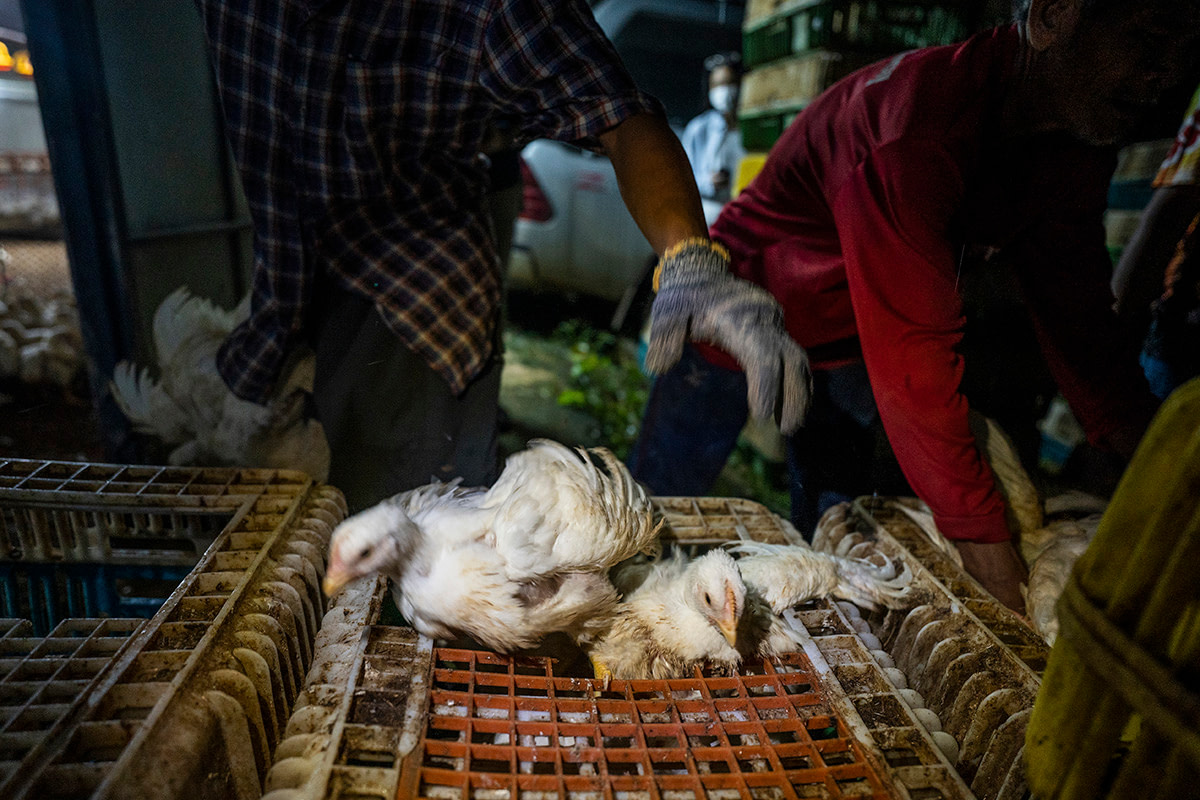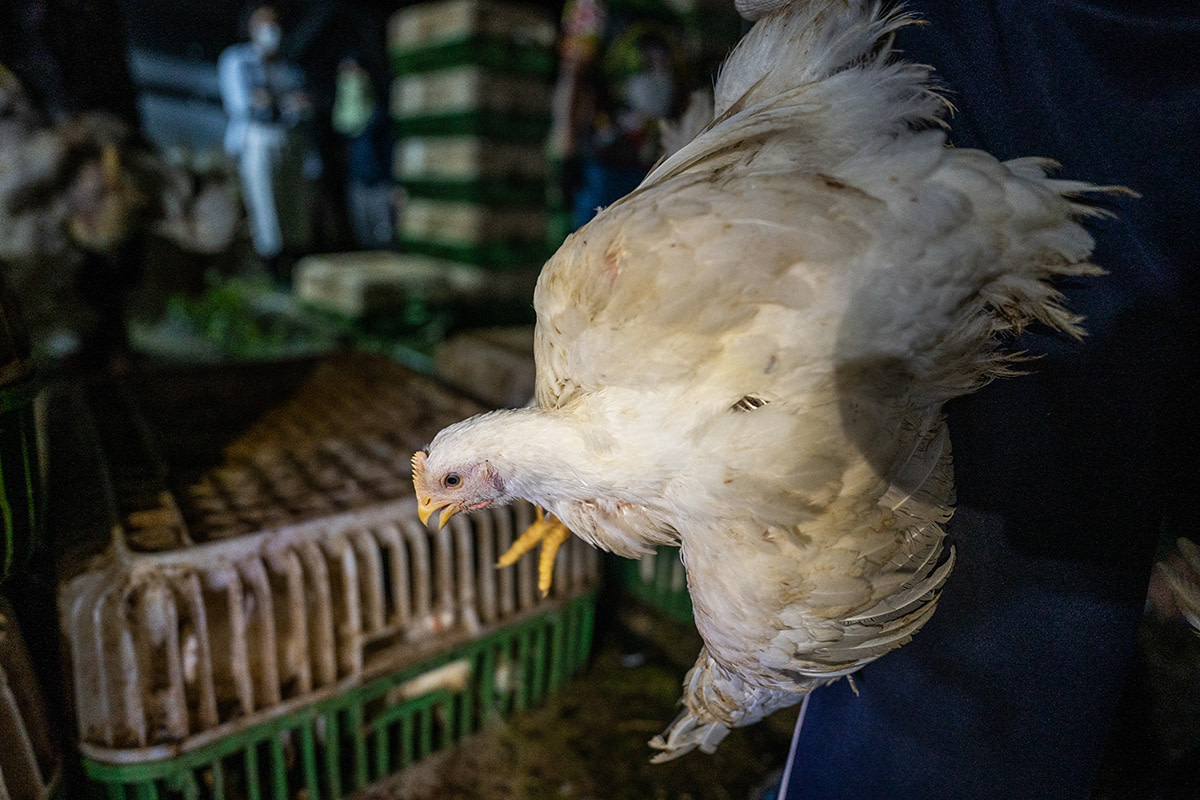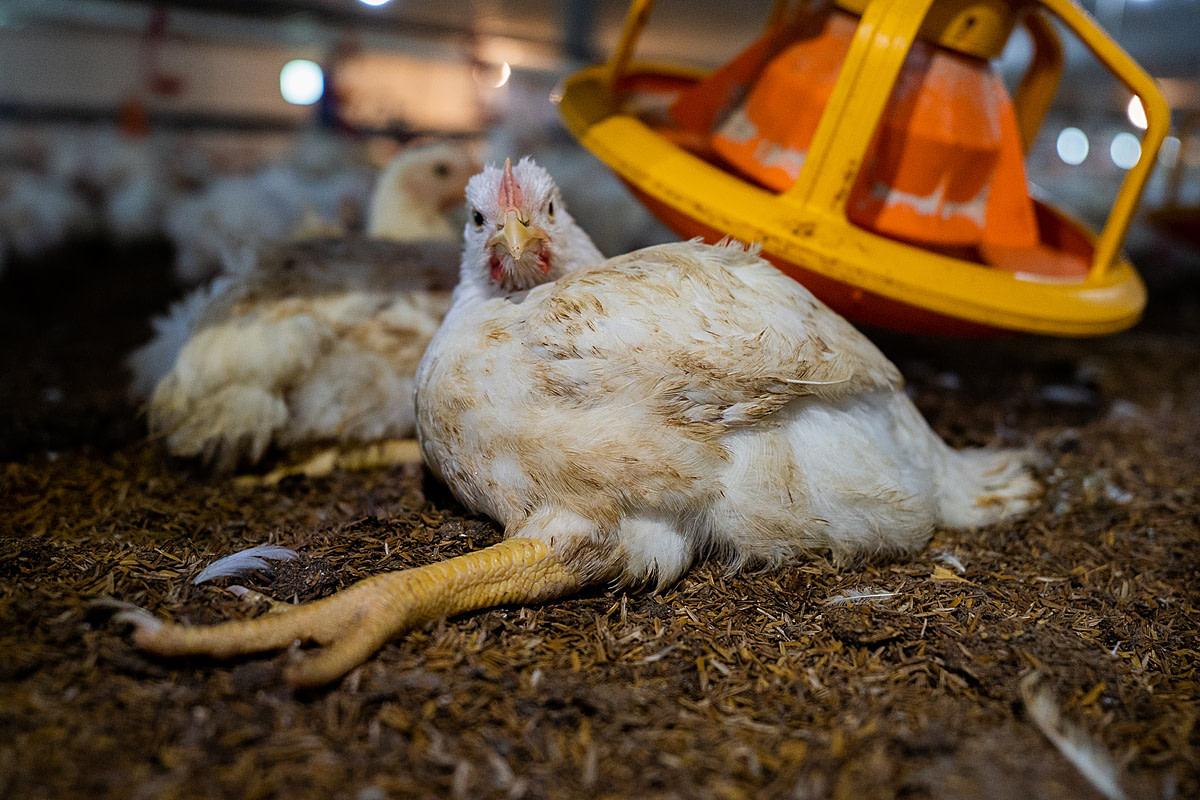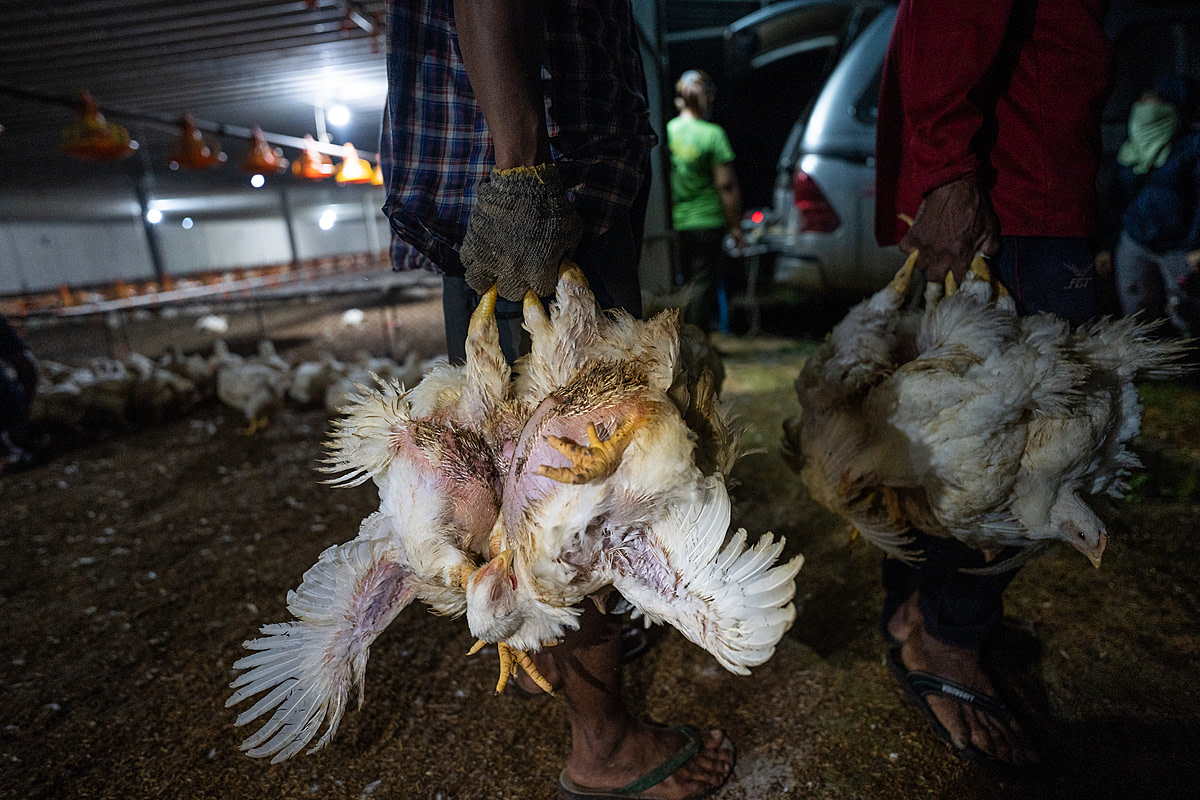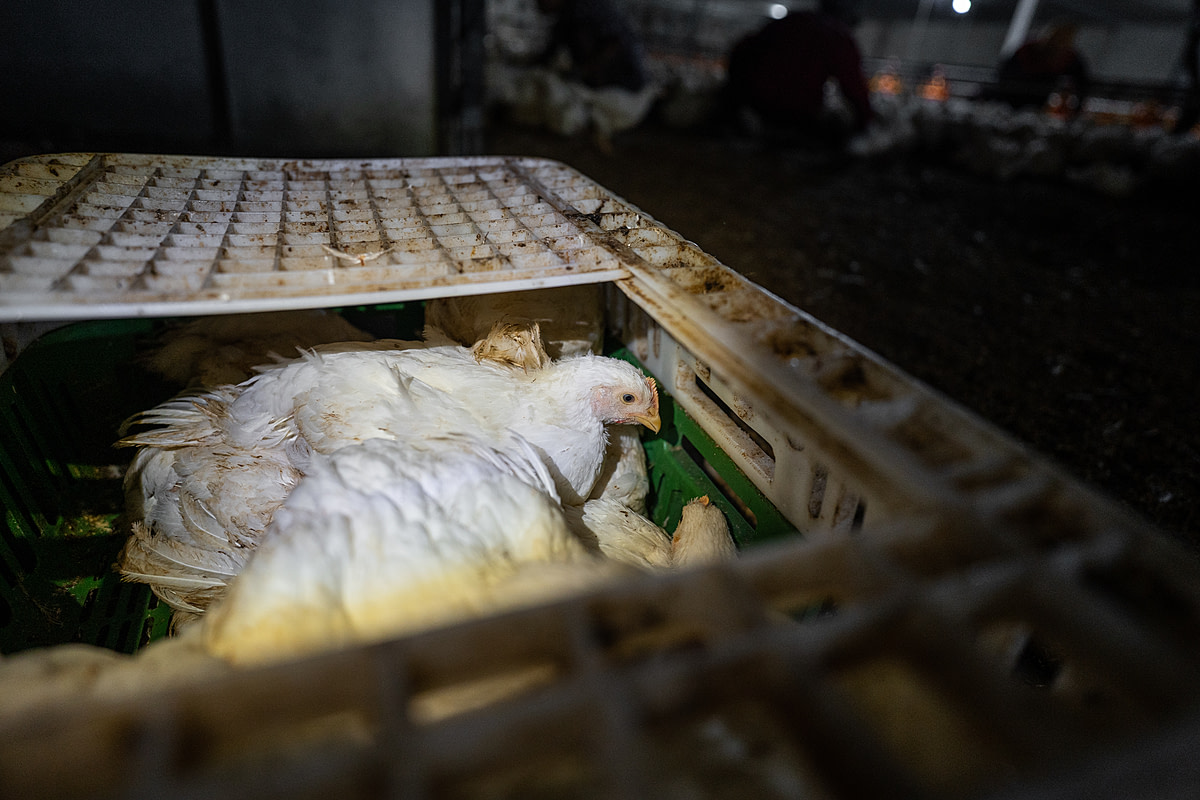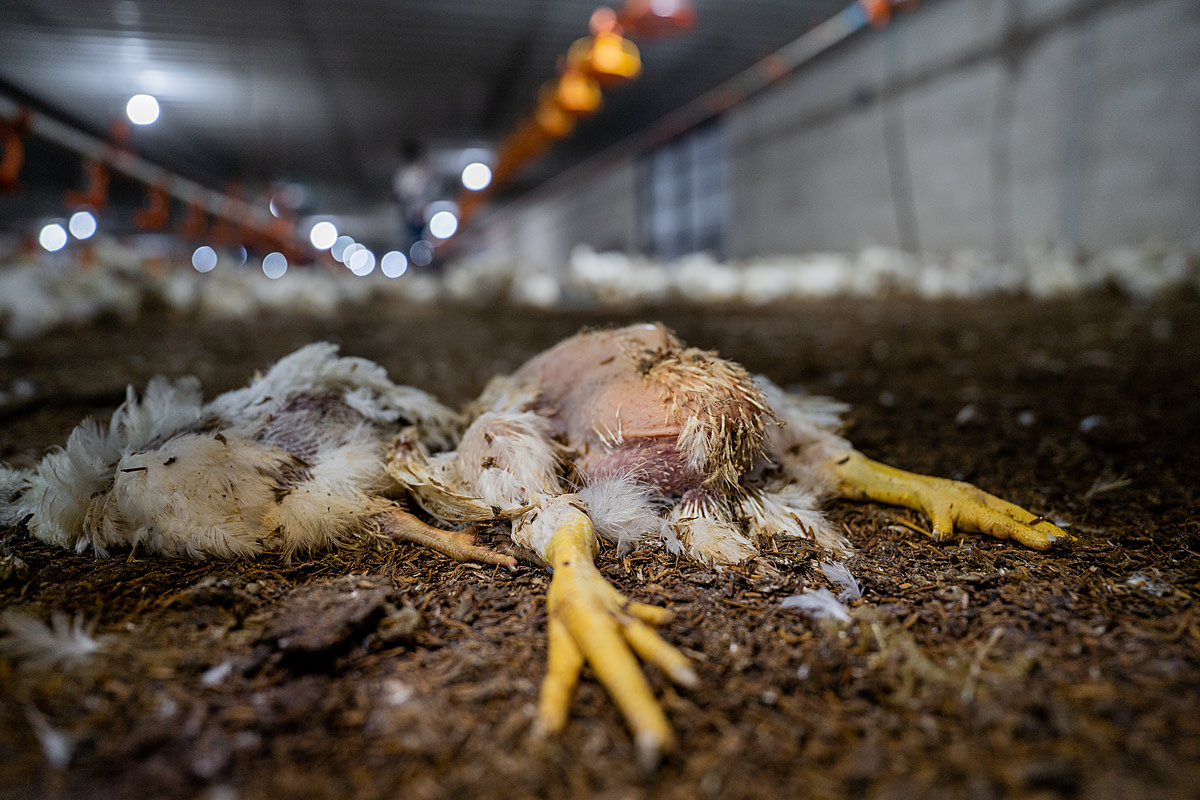On an industrial broiler chicken farm in Thailand, a worker drops chickens being sent to slaughter into a transport crate. The frightened chickens struggle as they fall into the crate. Thailand, 2022.
Haig / World Animal Protection / We Animals
Together with World Animal Protection Thailand, We Animals photojournalists Haig and Taichi Kaito investigated the brutal lives of broiler chickens on industrial farms supplying popular fast-food chains in Thailand. We documented disturbing visuals, including the hand-catching of birds, overcrowding, and sick and dying chickens.
During September 2022, in partnership with World Animal Protection Thailand, our team conducted a survey and investigation of contracted industrial chicken farms in central and eastern regions of Thailand—an area which raises chickens to supply restaurants and corporate supermarket chains for local and international distribution. Chicken meat is Thailand’s third largest export, and the industry kills almost almost two billion birds each year.
Chickens being sent to slaughter are captured by workers at a broiler chicken farm in Thailand. The workers gather several chickens at once, grabbing each individual by their feet. Once the worker catches several chickens, they will hold them upside down by their feet and carry them as a group to transport crates. Thailand, 2022.
Taichi Kaito / World Animal Protection / We Animals
Frightened chickens hang upside down from the hands of a farm worker at a broiler chicken farm in Thailand. The chickens are being removed from the farm’s rearing shed to send them to slaughter. After capturing the chickens, workers carry them upside down and roughly push them into transport crates. Thailand, 2022.
Taichi Kaito / World Animal Protection / We Animals
Despite claims being made by popular fast-food chains that their suppliers’ chickens are raised with care and live healthy lives, the findings from our investigation reveal the grim reality for birds inside Thailand’s poultry farms, as presented in World Animal Protection’s comprehensive report, The Real Secret Recipe: Revealing the Hidden Secrets of Chicken Meat Production.
“We want to bring the evidence, these videos and photos, to show Thai people the atrocity that really exists in the chicken industry.” ― Orkorn Thanachalakorn, Head of Campaigns, World Animal Protection Thailand
Editor's Note:
Our work in this region was only possible because of Asian advocates who work on behalf of animals across Asia. While these visuals depict a specific region, animal exploitation is a global issue taking place in every country.
WATCH WORLD ANIMAL PROTECTION THAILAND’S CAMPAIGN VIDEO
Intensively reared chickens are housed by the tens of thousands in sheds on industrial farms all around the globe. Chickens can live for over six years under natural conditions. On industrial farms, they will live for approximately 45 days before being sent to slaughter.
An injured chicken who can no longer stand up looks into the camera from the floor of a massive broiler chicken rearing shed in Thailand. This young animal’s legs can no longer support their body’s large size and weight, and they struggle to move. This farm has approximately 22,000 30-day-old chickens living in densely crowded conditions. Thailand, 2022.
Haig / World Animal Protection / We Animals
During this assignment, our photojournalists documented farms with between 22,000-27,000 birds per shed. Broiler chickens are bred to produce the maximum amount of meat on the thigh and breast in the shortest time possible. The birds on the farms we visited are housed in sheds with continuous artificial lights kept on for up to 24 hours a day and with fans running to maintain a temperature of approximately 25 degrees Celsius (77 degrees Fahrenheit). This combination of lighting and temperature stimulates the birds to eat and drink continuously, which leads to rapid weight gain. The pressure this puts on their bodies causes many to suffer from heart attacks or become unable to hold their own body weight, resulting in lameness.
Workers grip young chickens being sent to slaughter by their feet on an industrial broiler chicken farm in Thailand. After capturing a group of chickens, workers hold the frightened birds upside down as they carry them to transport crates. Thailand, 2022.
Haig / World Animal Protection / We Animals
All around the world, birds raised for meat are treated as units of production. Every part of their lives is mechanized, a step on a production line.
The decomposing body of a dead chicken lies next to a wall that crawls with black mealworms at a broiler chicken farm in Thailand. This industrialized farm says it finds approximately four dead chickens daily inside its sheds and is required to keep its mortality rate to no higher than three percent of its flock. The bodies of dead chickens on this farm will either be incinerated or boiled and fed to farmed catfish. Thailand, 2022.
Taichi Kaito / World Animal Protection / We Animals
In response to the findings of this investigation, World Animal Protection is now urging KFC in Thailand to commit to better chicken welfare on the country’s broiler farms.
“The suffering of food animals must not be normal. It must be something that society cannot accept. We all must help stop these atrocities immediately, and it starts with calling on the industry and businesses in the supply chain, such as KFC, to join the Better Chicken Commitment to improve chicken welfare policies and practices.” ― Rojana Sungthong, Director of World Animal Protection Thailand
The bodies of two dead chickens lie decomposing on the floor inside an industrial broiler chicken farm in Thailand. The farm says it finds approximately four dead chickens daily inside its sheds and is required to keep its mortality rate to no higher than three percent of its flock. The bodies of dead chickens on this farm will either be incinerated or boiled and fed to farmed catfish. Thailand, 2022.
Haig / World Animal Protection / We Animals
See more from this investigation and support the campaign via World Animal Protection Thailand’s website: The Real Secret Recipe
Data sources: Nation Thailand / Krungsri / World Animal Protection Thailand
Explore and download more visuals from this investigation via our stock platform.

